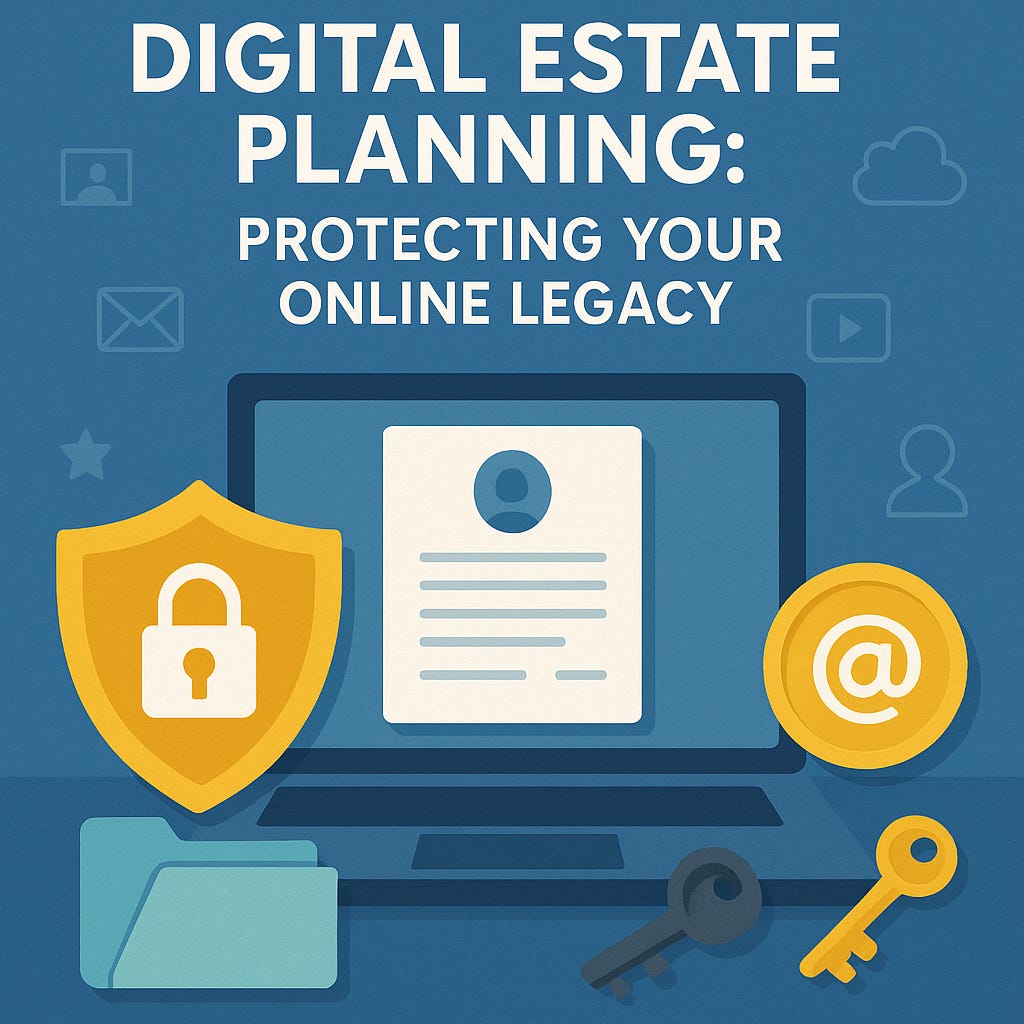Digital Estate Planning: Protecting Your Online Legacy
Don't Let Your Digital Life Disappear with You
Why It's Important
As more of our lives move online, from banking to photo albums, digital estate planning is no longer optional-it's essential. While most people focus on passing down property or financial assets, the growing value (and risk) of our digital footprint means neglecting it can lead to lost assets, unresolved accounts, or even identity theft after death.
Ignoring your digital estate can:
Leave subscription services billing indefinitely
Permanently lock away cryptocurrency and online funds
Erase sentimental digital memories like photos and videos
Create identity theft risks with unattended email or social media accounts
What It Is / How It Works
Digital estate planning involves identifying and organizing your online accounts, assets, and credentials so someone you trust can manage or close them when you're no longer able. Unlike physical belongings, most digital accounts are governed by user agreements that typically don't allow ownership transfers.
A well-prepared digital estate plan:
Catalogs your digital assets (e.g., accounts, passwords, crypto wallets)
Names a digital executor who can carry out your wishes
Provides clear, secure instructions on managing or closing accounts
Complies with current laws, like RUFADAA, to ensure legal authority
Without this preparation, even close family members may be legally barred from accessing critical information or funds.
How to Mitigate It
Here's how to keep your digital legacy safe and accessible:
Build a Digital Inventory
Start by listing:Financial accounts: banks, crypto, PayPal, etc.
Social media and email
Subscription services and cloud storage
Digital purchases: eBooks, music, movies
Websites, blogs, domains, loyalty points
Store Your Credentials Securely
Use a password manager that includes an emergency access feature (like 1Password, Bitwarden, or LastPass). This ensures trusted contacts can get in if something happens.Appoint a Digital Executor
Choose someone who understands tech and whom you trust. Define their role in your will or estate plan, ideally referencing your digital inventory. Trustworthiness should be your primary requirement.Set Up Platform Legacy Features
Facebook: Use Legacy Contact to manage your profile after death.
Google: Configure Inactive Account Manager to share access or delete data.
Apple: Enable Digital Legacy for iCloud and device access.
Microsoft: Use Inactive Account Manager for accounts like Outlook or OneDrive.
Amazon: Has no clear legacy option-share account details securely as needed.
Create Written Instructions
Document how to access important assets and outline what should be done with them-whether accounts should be deleted, archived, or transferred.Store Your Plan in a Safe, Legal Place
Keep your digital estate plan with your physical estate documents. Consider using encrypted USB drives, safety deposit boxes, or secure cloud vaults. Let your digital executor know where it's stored.
How to Configure or Use These Tools
1Password or Bitwarden: Add all login credentials and enable emergency access or designate a trusted contact.
Facebook: Go to Settings > Memorialization Settings to set a Legacy Contact.
Google: Visit myaccount.google.com/inactive to select what happens if your account becomes inactive.
Apple: In iOS or macOS, go to Settings > Apple ID > Password & Security > Legacy Contact to add someone.
Microsoft: Use their privacy dashboard to set account activity preferences.
One Feature That Stands Out
Facebook's Memorialization settings are especially thoughtful-they let you designate a Legacy Contact who can manage posts, update profile pictures, and even download shared content, giving families a way to preserve memories without compromising privacy.
Making Digital Estate Planning Part of Your Routine
It's easy to treat digital estate planning as a one-time task, but regular maintenance is key:
Review your digital estate plan annually or when major life changes occur.
Add new accounts or services as you go.
Discuss your plan with your executor and family-transparency prevents confusion or disputes later.
Consider consulting an estate planning attorney
Explore specialized cloud-based digital estate planning services
By keeping this process part of your ongoing password and account hygiene, you ensure your digital legacy reflects your true intentions-and prevents unnecessary stress for your loved ones.
If you're concerned about your overall online privacy and want a personalized assessment of your potential risks, you can schedule a free privacy consultation here






Very important read!